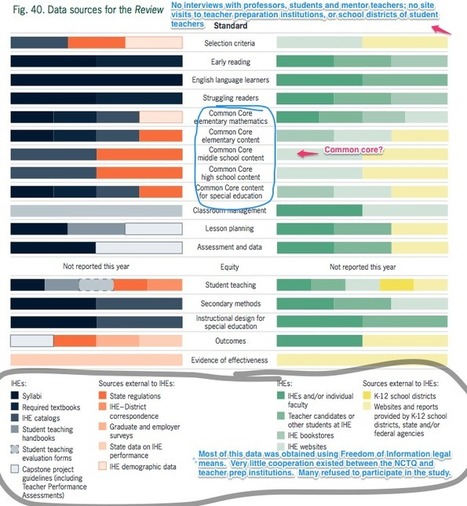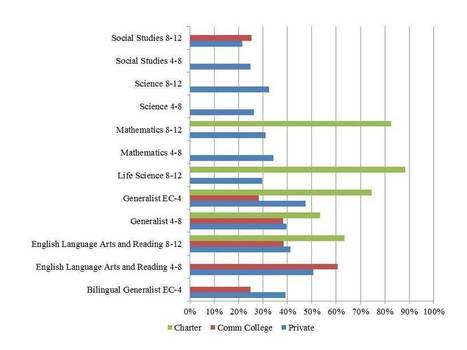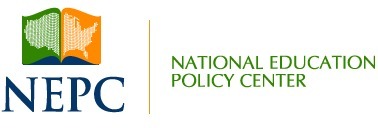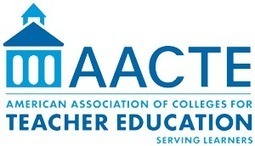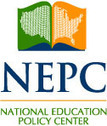 Your new post is loading...
 Your new post is loading...
The American Evaluation Association describes standards and guiding principles for conducting evaluation research. The posts provided in this collection document the violations of these principles in the research and reports released by the NCTQ.
__________________________________________________________ Quoted from website of American Evaluation Association: http://www.eval.org/p/cm/ld/fid=105: "The Guiding Principles for Evaluators serve as the cornerstone of good evaluation practice. Developed in 1994 as guidelines for sound, ethical practice, they have been broadly vetted with the AEA membership and reviewed and revised at regular intervals, including most recently in 2003, in order to ensure that they remain current with the field. In 2006-2007, the AEA Ethics Committee worked with a range of evaluators to develop a training package aimed at introducing the Guiding Principles in a workshop format and engaging evaluators in discussion about ethical practice. The resulting package, having been reviewed by an expert panel and approved for distribution by the AEA Board of Directors, is available for use for personal instruction or as a starting point for facilitating a workshop on the Guiding Principles."
Main page describing the Guiding Principles with related documents and downloads may be found at:
http://www.eval.org/p/cm/ld/fid=51
"AACTE Response to 2021 NCTQ Report
We at AACTE are dedicated to serving as a national voice and resource on behalf of the educator preparation profession. In anticipation of the National Center on Teacher Quality’s (NCTQ) release of yet another round of flawed ratings for educator preparation programs, AACTE re-asserts its long-standing belief that the NCTQ model of program evaluation lacks the multiple-accountability, science-based measures necessary to assess teacher preparation program quality legitimately and accurately.
NCTQ evaluations methods are superficial, subjective, and short-sighted. NCTQ ignores more useful, revealing, available data such as federal Title II disclosures and science-based performance reports published by many states, and instead bases its conclusions on course catalogs, syllabi, observation forms, degree plans, and student teaching/district agreements, without direct dialogue or input from faculty. As such, the ratings NCTQ assigns programs are nothing more than shallow, incomplete, and subjective interpretation. As a case in point, for the recent set of ratings on admission standards, NCTQ used institution- wide ACT/SAT score means for many of the institutions. As you know, these scores are not necessarily the scores for students in the teacher education programs, given that, at the institutional level, such scores only reflect the status of students when they are admitted to the institution. Because not all the students admitted persist in the program, scores at the time of admission to the institution tell nothing about the scores of those who do persist to program admittance and eventually to graduation.
Additionally, we believe NCTQ’s superficial evaluative methods can have potentially counter- productive consequences. In the forthcoming report, NCTQ will administer ratings against program diversity and admissions standards. Given the quality of NCTQ’s previous work, we do not anticipate that any ratings assigned in the newest report will accurately reflect the work being done by programs to address these challenges.
AACTE’s work in this area, in partnership with our members, reaches beyond program diversity and seeks to impact the broader PK-20 landscape. The unprecedented challenges of remote and hybrid learning environments have undoubtedly required innovative approaches to preparing teacher candidates for a vastly different instructional context. It has also reaffirmed the need to prioritize preparing teacher candidates to address the systemic racism that exists in our education system. We do not expect NCTQ to capture and accurately reflect the innovations undertaken by institutions to address these challenges.
Together, we can combat the subjective and potentially harmful work of NCTQ. AACTE encourages its members to share their own research, grounded in data-driven decision making, and evidence demonstrating the efficacy of their programs with their local and state communities. AACTE will continue to lead conversations at the national level and elevate the great work happening at our member institutions across the country. We believe we must collectively engage in open dialogue about what quality educator preparation looks like while pushing for greater transparency and objectivity in the NCTQ review process." To download pdf document, please click on title or arrow above or at the following link: https://secure.aacte.org/apps/rl/res_get.php?fid=5663&ref=rl
By Mercedes Schneider "It’s June, which means that the corporate-reform nest, the National Council on Teacher Quality (NCTQ), will be publishing a fresh set of useless teacher training program reviews. NCTQ “rates” teacher training programs based upon artifacts. An NCTQ rating does not require a site visit. NCTQ even hires students and others to gather the superficial information upon which it bases its ratings. Georgia State University Professor Emeritus of Science Education Jack Hassard had this to note about reading NCTQ’s 2014 “report” on traditional teacher training programs:
"When you read the NCTQ report it seems as if teacher prep institutions are the enemy. …All of the data come from paper or online documents. None involved interviews or discussions with people at the teacher prep institutions. As hard as this is believe, it is the pattern that the NCTQ has followed since it was formed by the Thomas Fordham Institute." What is truly sad (and particularly telling) is that NCTQ will even grade a program that doesn’t exist. Now, that has to be embarrassing. http://dianeravitch.net/2013/06/24/aaron-pallas-the-trouble-with-the-nctq-ratings-of-ed-schools/ ; So, in an apparent effort to demonstrate a credibility that it cannot possibly have based upon the superficial manner in which it “grades” teacher preparation programs, NCTQ accepted an offer to partner with the University of North Carolina (UNC) and Vanderbilt University in a 2015 study of NCTQ’s teacher prep ratings. The full study can be seen here: NCTQ-r6_boldBlue_toPrint_May2015
https://deutsch29.files.wordpress.com/2015/06/nctq-r6_boldblue_toprint_may2015.pdf UNC’s report can be seen here:
http://www.northcarolina.edu/?q=news/2015/05/unc-study-examines-nctqs-ratings-teacher-preparation-programs-and-measures-nc-teacher   The opening page of the full study offers this summary statement in bold: "With our data and analyses, we do not find strong relationships between the performance of TPP (teacher prep program) graduates and NCTQ’s overall program ratings or meeting NCTQ’s standards." Of course, NCTQ President Kate Walsh is not pleased that her non-official, non-accredited, self-appointed, corporate-reform-promoting teacher prep grading organization now faces further public criticism."... For full post and access to all links and reports, click on title above or here: https://deutsch29.wordpress.com/2015/06/02/nctq-finally-gets-formally-rated-and-it-isnt-pretty/
By Louann Reid, Chair Conference on English Education
"It’s déjà vu all over again. The second annual NCTQ Teacher Prep Review compounds the shortcomings of last year’s report. While information from more institutions was allegedly included, the evidence is neither robust enough nor deep enough to support the report’s recommendations. Possibly the most insupportable change is the move to rankings instead of ratings.
Rankings are dangerous, in part because people believe them. We are so fond of Top 10 lists that we sometimes allow rankings to substitute for the evidence that we need. US News & World Report, partner of NCTQ, is probably best known for its annual rankings of colleges and universities. Criticism of those rankings emerges every September when the new rankings appear. US News has collected some of the arguments on their Debate Club website; they appear to be listed in rank order. One of many objections to ranking is the motivation to “game” the rankings by making changes with the intent of raising rankings. The NCTQ website includes a section that tells programs just what they need to do. For example, change the selection criteria by raising the GPA or requiring specific scores on the SAT or ACT and up you go. In the absence of reliable evidence that GPA or test scores correlate to more effective teaching, any high-quality teacher education program would ill serve many teacher candidates by making such changes to increase NCTQ rankings. Let me be clear here: I am in favor of meaningful criteria for entry into licensure programs. I am not in favor of setting those criteria without evidence of their connection to improved teaching."... For full post, click on title above or here: http://www.ncte.org/cee/reid_6-17-14
The link above includes responses from national and state organizations, deans, professors, and students to 2014 NCTQ-U.S. News & World Report Review.
Quoted from http://fullerlook.wordpress.com/2013/06/17/nctq-ranking-of-teacher-prep-programs-gets-an-f/ "In January, 2011, the National Council on Teacher Quality (NCTQ) and U.S. News & World Report announced their intention to evaluate and rank teacher education programs in the United States. The goal of this study is to review the quality of teacher preparation programs across the U.S., based on NCTQ’s standards for teacher education. This followed a series of reports assessing state-level Teacher Preparation policies across the nation. Because there are at least 1,400 university-based teacher preparation programs in the US, NCTQ relied on two methods to assess the practices of teacher preparation programs and the content in the courses offered by the teacher preparation programs. The first method was to ask preparation program representatives to respond to queries from NCTQ about programs. The second method was to collect and analyze the syllabi from the courses taken by students in teacher preparation programs. The purpose of this blog is to examine the effort by NCTQ to evaluate, judge, and rank university-based teacher preparation programs. My comments are separated into five sections:
(1) Inputs versus outputs
(2) Lack of research foundation
(2) Methodology employed
(3) Alternative programs ignored
(4) Superintendent critiques
(5) Ultimate impact"
For full analysis: http://fullerlook.wordpress.com/2013/06/17/nctq-ranking-of-teacher-prep-programs-gets-an-f/
Quoted from National Education Policy Center Blogpost authored by John Eckert, Ed.D: http://nepc.colorado.edu/blog/bogus-teacher-prep-ratings-and-zagats: ;
"Instead of actually visiting or studying programs, NCTQ attempted to collect syllabi from teacher preparation programs. Given NCTQ’s track record and stated mission, a dispassionate review of traditional teacher preparation programs wasn’t likely to follow. When colleges and universities chose not to participate in the syllabi gathering, NCTQ offered students $25 to $200 to provide syllabi. I, along with other colleagues, received emails from individuals claiming to be students at our institution, inquiring about syllabi to allegedly help inform their decision to take a class. On further inspection, these students were not enrolled at the college. Legitimate research is not conducted this way." (Full post here ---> http://nepc.colorado.edu/blog/bogus-teacher-prep-ratings-and-zagats)
"NCTQ's methodology has been criticized by numerous experts and education groups, including the American Association of Colleges for Teacher Education. Thirty-five chief academic officers from the education schools of the Association of American Universities and chancellors of the California State University System, the University System of Maryland and the State University System of New York, among others, have written to NCTQ and U.S. News & World Report expressing their concerns. By grading programs in an A to F manner, NCTQ simply seeks to create winners and losers based on its own parameters, not national standards." "NCTQ is an advocacy organization, not a research organization. A recent public letter by the Wisconsin Association of Colleges for Teacher Education expressed serious concerns about both NCTQ's motivations for conducting their review and the manner in which it was conducted. NCTQ studies have never been published in any peer-reviewed journal or by any other credible means of research dissemination. No research university or organization has ever endorsed NCTQ's methodology, nor can their studies be replicated by independent researchers." "Peer review and replication of research studies are the means by which the scientific community verifies results, draws conclusions and advances knowledge. Studies lacking any form of peer review and validation of results through replication lack scientific credibility. Moreover, studies that threaten or coerce an individual or institution into participation without informed consent, as NCTQ has done, engages in the highest form of unethical research behavior."
- Gerardo M. Gonzalez, Dean, Indiana University School of Education
Full response available here:
http://newsinfo.iu.edu/news/page/normal/24345.html?emailID=24345 
Quoted from Jay P. Greene, Jason Endacott post on NEPC's blog:
http://nepc.colorado.edu/blog/hubris-nctq-school-ratings ; ..."NCTQ describes the research basis for their standards in a lengthy document. Yet, even according to their own description only 8 of the 18 standards are supported by “strong research.” And in most of the 8 cases where they do claim to have strong research support, the research does not actually provide them with the strong support they assert. For example, the “Early Reading” standard assesses whether “The program trains teacher candidates to teach reading as prescribed by the Common Core State Standards.” None of the studies they cite actually examine the specific standard since none specifically examine what methods of teaching reading, if any, are actually prescribed by Common Core. As is the case with all 18 standards in the NCTQ rating system, one has to make a series of leaps between the research cited and the actual standard being used to judge teacher prep programs.
In the case of early reading, the “strong research” they cite examines whether teachers are familiar with the “five components of effective reading instruction,” and whether teachers who are certified and have masters degrees are more likely to know those five components. It turns out teachers are generally not familiar with the five components and are no more likely to know them if they are certified or have a masters. That’s all very nice, but isn’t the “strong research” supporting the standard supposed to show that knowledge of the five components, which presumably have something to do with teaching “reading as prescribed by the Common Core State Standards,” actually lead to improved reading by students? The strong research cited by NCTQ says it generally doesn’t: “This study also found no relationship between teachers’ knowledge of these components and their students’ reading growth – with the notable exception of third-grade students.” This is typical of the “strong research” supporting 8 of the 18 standards by which NCTQ judges Ed Schools.
Standards 1 and 6 address whether teacher prep programs select “teacher candidates of strong academic caliber” and whether “teacher candidates have the broad content preparation necessary to successfully teach to the Common Core State Standards.” In both cases the “strong research” on which these standards rely is a study by Boyd, et al examining the relationship between teacher characteristics and student achievement. Let’s leave aside the fact that NCTQ acknowledges that research by Harris and Sass as well as Chingos and Peterson contradict their standard. Even the Boyd, et al study they do cite does not specifically demonstrate that teachers from more selective programs or with more content training are more effective. First, Boyd, et al are careful not to make the type of strong causal claims from their work that NCTQ does:
'It is not easy to estimate how the achievement gains of students are affected by the qualifications of their teachers because teachers are not randomly sorted into classrooms. For example, if teachers in schools in which students perform best in math are more likely to be certified in math, one might be tempted to conclude that being certified to teach math contributes to higher student achievement. The causal relationship, however, may operate in the other direction; that is, more qualified teachers may be in schools where students perform well in math because they prefer to teach good students and because employers want to staff their courses with in-field certified teachers. Analysts need to be careful not to attribute the test-score gains associated with sorting to the attributes of teachers.'
Beyond the fact that Boyd, et al would not make the strong causal claims from their work that NCTQ feels free to do, the Boyd, et al study examines a basket of teacher qualifications and does not claim to be able to distinguish accurately between teacher experience, selectivity of the college they attended, content knowledge, and other characteristics because “many of the measures of teachers’ qualifications are highly correlated with each other.” In short, the Boyd, et al study is hardly the “strong research” in support of their standards that NCTQ claims it is. Do we need more examples of how NCTQ misinterprets or stretches research to claim that their standards are supported by “strong research”? Oh, how about one more… Standard 13 is “Equity” and judges teacher prep programs based on whether “The program ensures that teacher candidates experience schools that are successful in serving students who have been traditionally underserved.” The “strong research ” NCTQ cites for support of the claim “that entering teachers learn crucial methods of instruction and management through observation of and supervised practice in schools where staff are successfully teaching students living in poverty” is a piece by Ronfeldt. Unfortunately, Ronfeldt’s study appears to make the opposite claim. He finds that it is more important for student teachers to be trained in schools with low staff turnover that tend to have more advantaged students. He concludes:
'Should we place student teachers in “difficult-to-staff, underserved” schools to learn to teach? The main findings of this study suggest otherwise – learning to teach in difficult-to-staff field placement schools is associated with lower teacher effectiveness and retention. Moreover, the results demonstrate that being trained in field placements with higher concentrations of poor, black, and lowest-achieving students has no significant effect on teacher retention or effectiveness.'
I haven’t see this much unreliable citation of research since I read teacher union reports.
To be fair, NCTQ acknowledges that quality research on effective education practices is in short supply: “To the extent that high-quality research can inform how teachers should be prepared, NCTQ uses that research to formulate standards. Unfortunately, research in education that connects preparation practices to teacher effectiveness is both limited and spotty.” But this lack of evidence does not prevent NCTQ from confidently declaring that they know what teacher prep programs should be doing and judging them on that basis. If quality research is so limited, how does NCTQ know what everyone else is supposed to be doing?
And I’m sure that there is considerable room for improvement in teacher prep programs. Many of NCTQ’s recommendations are probably sensible, even if they aren’t backed by “strong research.” The problem is not so much that NCTQ is suggesting bad ideas as that they are claiming to know much more than they actually know. And they are willing to boss around everyone else despite not knowing as much as they think."
Full post here---> http://nepc.colorado.edu/blog/hubris-nctq-school-ratings
Quoted from Mercedes Schneider's Edublog: http://deutsch29.wordpress.com/2013/02/20/part-xvii-grading-the-nctq-advisory-board/: "UPDATE 06-20-13: Nine of the advisory board members listed below have been removed from the NCTQ website list of advisory board members. However, one member whose name was removed from the NCTQ website, Stefanie Sanford (as in Gates Foundation right-hand who is now with College Board), is listed as a board member on the recently-released sham report for grading teacher prep programs. The other seven names removed are Adamowski, Barnes, Hill, Keating, Koldyke, McGriff, Moir, and Rhee." *** "...Like NCTQ, I come uninvited. I come intrusively, expecting that I should have the right to grade this board. Unlike most members of the advisory board, I am a certified classroom teacher. I own no education business. I invest in no education companies. And most importantly, I have no foundations financing any effort associated with this review, or with any other aspect of my life, for that matter. I have no conflict of interest– other than that I see corporate reform for the money-making sham that it is.
So, let’s get to it, shall we?
My grading system includes a “rule out,” a condition that immediately will fail a number of board members regardless of any other criteria. It’s like the system that boards like this one have pushed to put me under as a classroom teacher. I am a Louisiana teacher. I am to be evaluated using my students’ test scores. I have been told that test scores count for 50% of my evaluation– unless the scores declare me “ineffective.” Then the scores are everything, all 100% of my evaluation. Nothing else matters. That’s the “rule out.”
In my grading of the NCTQ advisory board, my “rule out” involves board members 1) who have a clear corporate reform agenda coupled with no teaching certificate earned from the type of teacher prep program this board evaluates, and/or 2) some unseemly conduct that arguably reflects poorly on the teaching profession, including ethical violations related to student well being, and potential or realized financial gain associated with a conflict of interest. These result in an automatic F. If this seems unfair, advisory board members are encouraged to plead their cases with the local school boards corporate reformers are attempting to castrate.
Based upon my reviews in Parts III through XVI, the following advisory board members receive an F given some combination of the criteria set forth above."
Continue to full post -->
http://deutsch29.wordpress.com/2013/02/20/part-xvii-grading-the-nctq-advisory-board/
|
JOURNAL ARTICLE ABSTRACT: "The National Council on Teacher Quality’s (NCTQ) recent review of university-based teacher preparation programs concluded the vast majority of such programs were inadequately preparing the nation’s teachers. The study, however, has a number of serious flaws that include narrow focus on inputs, lack of a strong research base, missing standards, omitted research, incorrect application of research findings, poor methodology, exclusion of alternative certification programs, failure to conduct member checks, and failure to use existing evidence to validate the report’s rankings. All of these issues render the NCTQ report less than useful in efforts to understand and improve teacher preparation programs in the United States. The article also suggests alternative pathways NCTQ could have undertaken to work with programs to actually improve teacher preparation. The article concludes by noting that the shaky methods used by NCTQ suggest shaky motives such that the true motives of NCTQ for producing the report must be questioned."... For full article/download (open/free pdf) in Journal of Teacher Education: http://jte.sagepub.com/content/early/2013/09/16/0022487113503872.abstract
(June 18, 2014, Washington, D.C.) – Yesterday, the National Council on Teacher Quality (NCTQ) released its second annual Teacher Prep Review: A Review of the Nation’s Teacher Preparation Programs. Although parts of this report venture a conciliatory tone, as might be expected from NCTQ’s past reports, this review offers largely unhelpful recommendations that are based on questionable methodology. Public Shaming—Over a Document Review
In an attempt to provide a consumer-friendly guide to teacher preparation programs, NCTQ has moved from rating institutions on a 4-star scale to ranking them numerically—a divisive tactic that mostly serves to pit institutions against one another. Notably, these rankings have as little to do with graduates’ readiness to teach as did last year’s star system. Because of NCTQ’s history of misrepresenting data, only 118 of the 1,127 institutions reviewed fully participated in the report. In many instances, programs provided less than 50% of the information requested to evaluate whether a standard was met. Gaps were filled by NCTQ by downloading online course descriptions, catalogues, and syllabi and tracking down other materials from partner schools and districts. Even “full participation,” however, resulted in little more than a document review—hardly adequate evidence to judge graduates’ readiness to teach. Despite this lack of data, NCTQ draws sweeping conclusions about the entire field. The report goes so far as to recommend that prospective employers refer to these input-oriented ratings to help sort applicants for job openings—even as it acknowledges that “low-ranked programs can, and often do, graduate teachers who end up being effective, even superstars.” I advise school leaders to view this report with caution and consider carefully its usefulness in evaluating teacher candidates."... For full post, click on title above or here: http://aacte.org/news-room/press-releases-statements/462-statement-on-nctq-teacher-prep-review-from-sharon-p-robinson-ed-d-aacte-president-and-ceo
Guest Post by Peter Smagorinsky, The University of Georgia
"NCTQ’s announcement of its new edition of its Teacher Prep Review predictably exalts its own role in improving public education by requiring colleges of education to raise students’ test scores through the instruction of its teacher candidates once they are members of school faculties. I will briefly respond to a few of the claims that they make, which rely on rhetorical characterizations about “success” and “achievement” that spuriously elevate their belief that standardized tests reflect the whole of learning, a claim that few teachers or teacher educators endorse. In contrast, most teachers and teacher educators believe that the NCTQ’s narrow focus on standardized “achievement” tests undermine an authentic education that prepares students for work or life."... For full post, click on title above or here: http://nepc.colorado.edu/blog/response-new-nctq-teacher-prep-review
Selected quotes from full post: * "NCTQ's claims of objectivity are false. As Diane Ravitch revealed last year, NCTQ was started by the Thomas B. Fordham Foundation "as a new entity to promote alternative certification and to break the power of the hated ed schools," although NCTQ claims it is no longer affiliated with its founders. Despite the facts showing otherwise, NCTQ believes competition is the best bet for improving teacher preparation."
* "Consistent with its stance on similar professional issues, NCTQ supports the Growing Education Achievement Training Academies for Teachers and Principals (GREAT) Act. Although research and effective practices show that comprehensive preparation in content-specific pedagogical strategies, teaching diverse learners, and rigorous clinical experiences are essential to developing effective new teachers, the GREAT Act would require none of these features and, in fact, would lower standards for funded providers."
* "This review is based on a review of documents with such inconsistent participation and fragmented inputs that it would not be published by a credible, professional research organization." * "While NCTQ evaluated 1,130 institutions on various configurations of its standards, the report states that only 10 percent of institutions fully participated."
* "The fine print in the report's Program Ratings section (p. 13) states that elementary program ratings were based on five key "standards," and secondary program ratings were based on three key "areas." NCTQ does not explain how these standards were selected or how heavily each weighed in the review. Yet NCTQ went as far as to label 163 programs with a "Consumer Alert" as a warning to parents, prospective teacher candidates and school districts." *"The American Institutes for Research (AIR) has noted the shortcomings of using document reviews to measure teacher preparation program effectiveness. In its 2012 Evaluating the Effectiveness of Teacher Preparation Programs for Support and Accountability report, AIR lists several challenges with using process measures to evaluate teacher preparation programs: The research base of a document review is not robust enough to build assessment for accountability based on process measures; process measures do not always accurately capture what actually happens in preparation programs; and process data require complex qualitative measures that are difficult to score reliably across programs." * ""Even NCTQ's own audit panel recognized in its report that NCTQ must do a better job of "clearly and exhaustively explaining methodology and what findings do and do not mean." The audit panel also questioned the validity of using course syllabi to determine the effectiveness of a program, suggesting that NCTQ must improve its method of "studying how accurately reading syllabi reflects the actual content of classroom instruction."" * "NCTQ promotes to the public that its goal is to help improve teacher preparation. Yet NCTQ outright refuses to make rubrics available publicly or individually to institutions to show where programs did and did not meet standards. It does, however, make recommendations to policy makers on how they should regulate preparation programs. If NCTQ's goal was to help improve teacher preparation, rubrics should be released so that programs could utilize that information."
* "In the "Next Steps" for prospective and current students, NCTQ's recommendations are self-promoting, public relations steps intended to further promote the review – not to improve teacher preparation for future teachers." http://aacte.org/news-room/press-releases/nctq-review-of-nations-education-schools-deceives-misinforms-public.html
Selection from post authored by Theresa Montano at http://www.calitics.com/showDiary.do?diaryId=15104
..."Last week, Stanford education professor Linda Darling Hammond, chair of the California Commission on Teacher Credentialing, noted most schools of education nationally declined to participate in the study once they learned about the organization's methods, which involved "a paper review of published course requirements against a checklist that does not consider the actual quality of instruction that the programs offer.
While the NCTQ checklist is based largely on the design of undergraduate programs, California moved long ago to strengthen teacher education by requiring graduate level programs, which require subject matter competency before entering preparation. California has also moved toward accountability based on stronger evidence of outcomes, including rigorous tests of basic skills, content knowledge, and pedagogy. These include California's Teacher Performance Assessments, required under SB 2042, that have made the state the first in the nation to judge teachers' skills and abilities in real K-12 classrooms with real students.
The NCTQ report failed to recognize the importance of adapting teacher preparation to meet the changing student demographics and the reality of the social conditions where our teachers teach. Both UCLA and Loyola Marymount University, which were heavily criticized in the report, have highly respected teacher training programs. Students in both programs spend countless hours in subject matter preparation, literacy development, assessing student learning and clinical practice, providing the best in university field supervision and in developing genuine partnerships with local school districts.
I also question the report's assertion that graduate training programs in California are more likely to accept "lower achieving students." Grade Point Averages and tests scores do not necessarily make the best teachers, although GPA is considered when accepting students into the program. There are myriad tests teacher candidates take both to get into and out of a teacher education program. It does a disservice to these candidates and to the schools to be labeled "low achieving. Furthermore, California's diverse student population only serves to strengthen our teaching pool. Our teacher prep programs are drawing on these strengths to provide teachers that truly understand the unique characteristics of our students to bring out the best in them.
This is not to say that teacher preparation programs in California are perfect. We do need to focus on improving them, but in a thorough, thoughtful way that uses accurate data as well as evidence. The California Teachers Association has convened a representative group of educators, CSU faculty and students to engage in discussion and research on the topic. Working with education experts like Boston College Professor Andy Hargreaves, an internationally renowned leader on education reform, we will develop a set of comprehensive recommendations. Because we put the best interest of our diverse student population at the center of our union work, our recommendations will be not be at the expense of an authentic focus on closing the educational opportunity gap or culturally responsive teaching.
And, these recommendations most definitely will include multiple measures for program evaluation - far beyond what was included in the NCTQ."
Full post at http://www.calitics.com/showDiary.do?diaryId=15104
Quoted from introduction to AACTE Member's Key Points about NCTQ Report https://secure.aacte.org/apps/rl/resource.php?resid=272&ref=rl:
"Most educator preparation programs embrace accountability through a number of efforts (e.g., national accreditation, state program approval, regional accreditation, federal Title II reporting, performance-based exit measures such as edTPA, Teacher Work Sample, and other measures). However, their concerns with the National Council on Teacher Quality (NCTQ) - U.S. News & World Report national review of education schools and NCTQ’s work in general are based on the numerous documented illustrations of NCTQ’s flawed methodology and demonstrated bias. There is no value to evaluating our education system, in PK-12 or higher education, if the evaluation is tainted by such flaws. This document-based review of educator preparation programs lacks the credibility to inform change.
Below is a compilation of AACTE members' key points about NCTQ and/or its national review of education schools" https://secure.aacte.org/apps/rl/resource.php?resid=272&ref=rl
"Two things, however, are most unfortunate: The NCTQ indicators of these standards do not provide an accurate picture of the candidates actually prepared or the opportunities actually offered by these programs, and they provide no information about the outcomes of programs — what candidates actually learn and can do. In addition, based on the inaccuracies that are surfacing for most programs, the data collection was obviously conducted very poorly. It is truly unfortunate for the field of research and the field of teacher education that the development of the data collection were done with so little concern for accuracy. And it is a shame that NCTQ and U.S. News and World Report would publish ratings without even checking the data."
Full post at:
http://www.washingtonpost.com/blogs/answer-sheet/wp/2013/06/20/problems-with-new-ratings-of-teachers-colleges-point-by-point/ ;
"NCTQ’s methodology is a paper review of published course requirements and course syllabi against a check list that does not consider the actual quality of instruction that the programs offer, evidence of what their students learn, or whether graduates can actually teach. Concerns about the organization’s methods led most schools of education nationally and in California to decline to participate in the data collection. (NCTQ’s website indicated that fewer than 1% of programs in the country “fully cooperated” with the study.) NCTQ collected documents through websites and public records requests. The ratings published in this report are, thus, based on partial and often inaccurate data, and fail to evaluate teacher education quality."
http://www.washingtonpost.com/blogs/answer-sheet/wp/2013/06/18/why-the-nctq-teacher-prep-ratings-are-nonsense/ ;
Quoted from http://www.otlcampaign.org/blog/2013/06/18/would-nctq-pass-its-own-report-card
"The way in which teachers develop the knowledge, skills and abilities to enter the classroom has become an issue of greater focus in the public policy space as the country looks to improve the distribution of well-prepared and effective educators. On Tuesday, the National Council on Teacher Quality (NCTQ) released a national review of the quality of teacher preparation programs with U.S. News and World Report. The report rates programs based on a list of criteria which have been called into question by education experts as valid measures for the value and impact of teacher preparation programs. In considering the merits merits of NCTQ’s rating system, let’s review the 5 key reasons why NCTQ isn’t a credible authority on the subject of teacher preparation. 1. NCTQ’s Agenda for the Report is Clear
NCTQ has a documented bias against university-based teacher preparation programs. Why? The organization was originally founded to promote alternative certification programs, which means it has a vested interest in discrediting university-based programs. Every review conducted thus far of traditional, univerity-based preparation fails or gives a low rating to the majority of programs. This one is no different – only 4 programs (out of over 1100 included in the review) got the highest rating of four stars. And only 10% overall got a three-star rating or above. 2. NCTQ Employs Some Serious Double Standards Regarding Quality
If the point of evaluating teacher preparation programs is to improve the teaching profession, shouldn't all programs be held to the same quality standards? This is not the case based on NCTQ's analysis. While NCTQ examines the efficacy of university-based programs, it doesn’t review the quality of its own alternative certification programs. Those programs get a pass on accountability. 3. The Ratings Aren't Based on a Clear, Consistent Set of Standards
NCTQ’s standards and methodology are inconsistent and change from year to year to year. These shifts discredit the reliability of NCTQ’s standards and methodology for use in judging any programs since the organization started rating teacher education programs. 4. NCTQ’s Methodology For Judging ‘Quality’ Is Flawed:
NCTQ conducts much of its review and analysis based on quality indicators like course documents and program curricula. This is similar to evaluating the quality of a restaurant and its food by collecting and analyzing menus. The ratings system ignores professionally accepted standards, and includes no actual visitations of higher education programs or interviews with graduates. 5. The NAEP Mismatch
NCTQ’s 2013 State Teacher Policy Yearbook is inconsistent with the results of the National Assessment of Educational Progress (NAEP), widely referred to as the Nation’s Report Card. Top-achieving states on the NAEP test, such as Massachusetts, Minnesota, New Jersey and Vermont, received low grades of "C" or "D" from NCTQ. Likewise, there are many cases of states that performed toward the bottom of NAEP that received high ratings in state policy from NCTQ. Conclusion
There is certainly room for improvement in teacher preparation programs across the country, but we need organizations and comprehensive ratings systems that can help move the profession forward. NCTQ is masking its dislike of university-based programs with rhetoric focused on public transparency and accountability. Simultaneously, it’s promoting the expansion of alternative certification programs it doesn’t think need to be held to the same quality standards. It’s clear our nation needs a comprehensive approach to teaching quality, one that starts with strengthening the current preparation teacher system, rather than dismantling it. NCTQ’s report should not be taken seriously as a useful tool for ensuring every child in America has a well-prepared teacher – a goal that should be at the heart of any quality standard report."
http://www.otlcampaign.org/blog/2013/06/18/would-nctq-pass-its-own-report-card
|



 Your new post is loading...
Your new post is loading...




